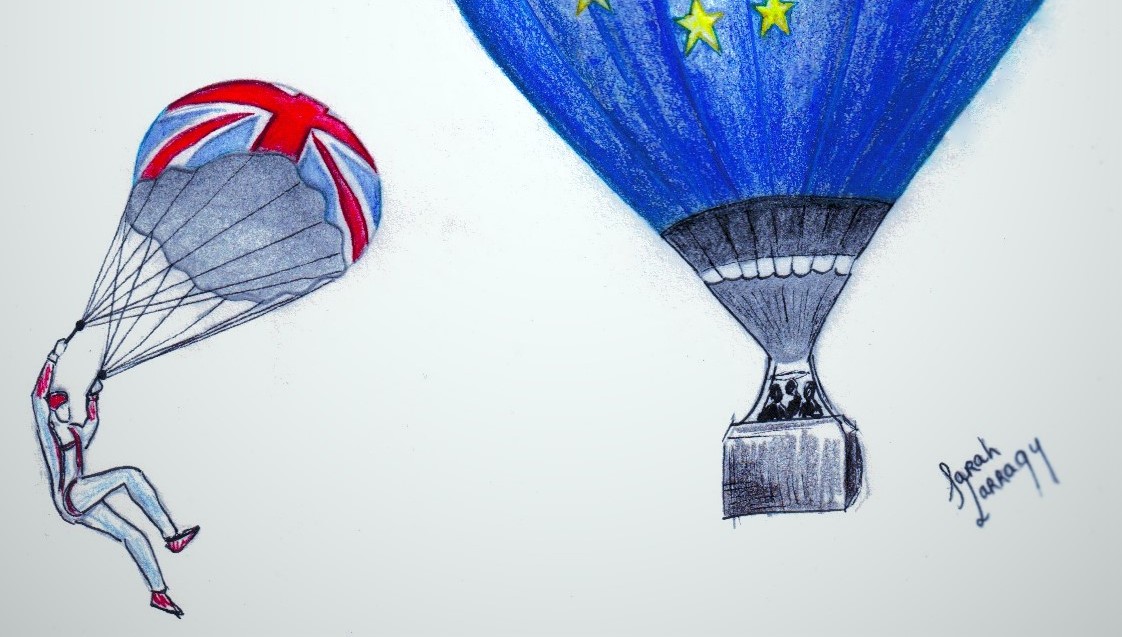Iúr Cinn Trá; the yew tree at the head of the strand. If my town, Newry, is the head, then the EU was the neck and backbone that gave it support in harder times. The head of the strand, the frontier, the edge. It seems that that is where my town now finds itself, on the edge.
This post-Brexit situation is a strange, precarious position in which to be. It is unsteady and unpredictable, a series of known unknowns. Brexit has come to pass, and yet it hasn’t. It is a phantom reality.
I think of Europe, and I think of what it is to be European.
Truth be told, I have never really considered myself European. To me, a European was someone who lived on the continent, who drank small, strong shots of espresso and who smoked long, thin cigarettes. I have always felt that I simply lived on an island of an island, existing on the edge of something bigger.
That is in many what I feel Europe represents: the other. Europe means an openness, a greater diversity, and an accessibility to different ways of thinking. So in having chosen to leave Europe, is it this too that we have chosen to leave behind?
I think of my town, of Newry, of the little edge of the world from where I come. My town that straddles the border and is neither fully Northern nor fully Southern. What does Brexit mean for her?
The morning of the referendum result I genuinely believed that we would all wake up and laugh at how we almost tried to leave the EU. I left my town and came down on the bus to Dublin, because “we” did try to leave the EU, and “we” succeeded in such trying.
Those who voted to leave were not irrational in their voting. These were people who felt that they were not being heard, people who were fed up with the way things were.
This was them voting and making themselves heard. And now we are in the aftermath, and it is unchartered territory and I don’t really know what to think.
Like new parents, it seems that no one in government is quite sure as to what they should be doing. I must admit that it doesn’t feel as though a whole lot has changed, but there is now a heaviness that didn’t previously exist.
Home is still home, but people are concerned about what happens next. It’s not the apocalypse people feared, but nor is it anything to hold up as an example of anti-EU propaganda. My town voted to stay, and is being forced against her will to pack her bags and leave.
Theresa May herselfdespite being pro-Remain, understands that once you choose to leave, you cannot half-leave. You leave, you go, you are gone.
My town’s name in Irish could be translated as meaning the yew tree at the head of the strand. And perhaps the head is now a hinterland. My town has always felt small, but now it feels smaller.
The EU opened doors, and opened borders. My town had her fair share of troubles, and the European Union helped to soothe those too. Things were better in the good old days, when we part of the European Union, perhaps we’ll say. Or perhaps we won’t. It remains to be seen.
I read recently part of six of Yeats’ “Meditations in Time of Civil War: The Stare’s Nest by My Window”, and in the wake of Brexit, I have somehow strangled its interpretation and reappropriated its meaning as it suits me best now. “We are closed in,” writes Yeats, “and the key is turned on our uncertainty.”
What Brexit promised is not what Brexit will be able to provide, and it is here that Yeats’ lines seem most astute, “We had fed the heart on fantasies, The heart’s grown brutal from the fare.”
Illustration: Sarah Larragy







